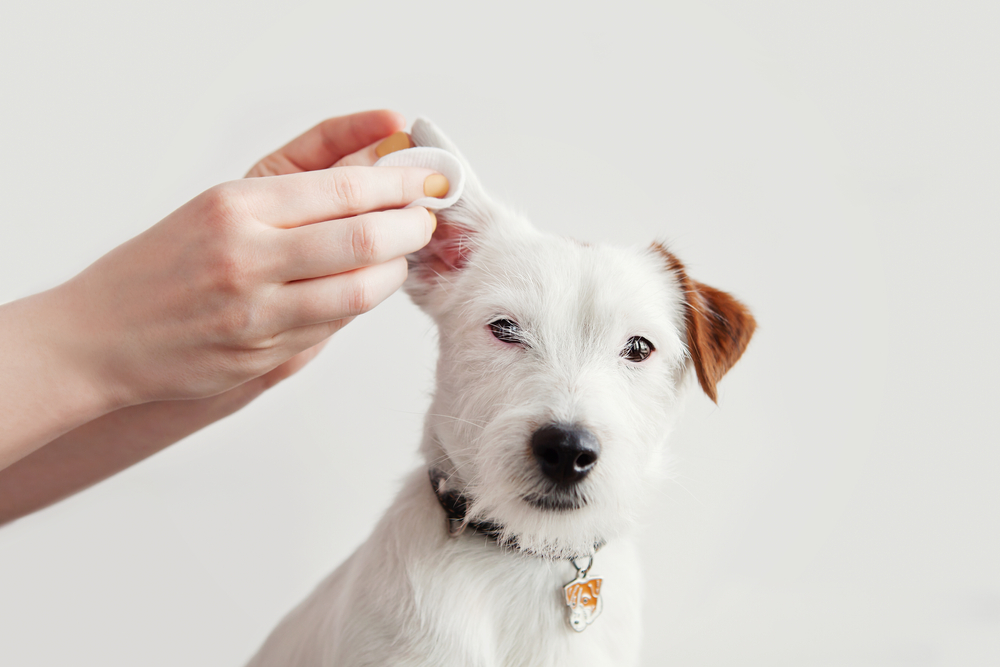
As a devoted dog owner, ensuring the well-being of your furry companion is a top priority. One aspect that often gets overlooked is ear health. Yet, neglecting it can lead to painful and potentially severe consequences.
Ear infections are a common problem in dogs. They can damage your dog’s ear canal if you do not address the problem quickly. It is crucial to catch them early and take action to prevent them from happening in the first place. By doing so, you can help keep your pup’s ears healthy and comfortable.
Recognizing Ear Infections in Dogs
The first step in addressing ear infections is to familiarize yourself with the telltale signs. Keep an eye out for excessive head shaking or scratching at the affected ear. These signs can indicate discomfort or irritation.
Other common symptoms include:
- Agitation.
- Whining.
- Redness or swelling of the ear canal.
- An unpleasant odor emanating from the ear.
- The presence of black or yellow discharge.
In severe cases, your pup may even exhibit balance irregularities or disorientation. If you notice any of these warning signs, it is best to seek veterinary attention promptly.
What Causes Ear Infections?
Ear infections in dogs can arise from various factors, often working in tandem. Moisture buildup within the ear canal creates an ideal breeding ground for bacteria and fungi. This leads to infections. Excessive ear wax or foreign objects can also contribute to the problem.
Also, allergies, food sensitivities, and environmental factors like excessive humidity or water exposure can increase the risk of ear infections. Identifying the potential causes will help you take proactive steps to prevent and manage this canine affliction.
Treatment Options for Ear Infections
If your dog is dealing with an ear infection, get them to the vet right away. The vet will give your pup a full checkup to figure out what is going on. They may even take a sample of the gunk in your dog’s ear to help them pinpoint the cause and come up with the right treatment plan for your furry friend.
The typical treatment for a dog’s ear infection involves a multi-pronged approach. Your veterinarian will likely prescribe antibiotics or antifungal medications to directly address the infection.
Your vet will probably prescribe some anti-inflammatory meds to help reduce the swelling and discomfort. They might also recommend using ear cleaning solutions or drying agents to help your pup’s ears heal and prevent future infections.
Prevention Strategies for Ear Infections
Treating ear infections in dogs is crucial. The best approach is to prevent them from happening in the first place. The following actions will help:
- Regularly clean your pup’s ear with a vet-approved solution.
- Gently wipe the visible portion of the ear canal to help remove excess wax and debris.
- Dry your pup’s ears thoroughly after swimming or bathing.
- Protect your furry friend’s ears during activities that could expose them to water or debris.
Understanding the Canine Ear
To better appreciate the importance of ear care, it is helpful to understand the anatomy of a dog’s ear. The canine ear comprises three main parts: the outer ear, the middle ear, and the inner ear. Ear infections typically occur in the outer or middle ear.
They can stem from various factors, including bacteria, fungi, and even parasites. By familiarizing yourself with this intricate structure, you will gain a deeper understanding of the potential issues and how to address them.
Ear infections in dogs can be a frustrating and painful experience. But with the right knowledge and proactive approach, you can effectively manage and even prevent them. You can ensure your pup’s ears remain healthy and free from discomfort. Remember, a little extra care and attention to your dog’s ear health can go a long way in maintaining their overall health and happiness.
For more on canine ear infections, visit Community Pet Outreach at our Lewisville, Texas, office. Call (972) 848-8930 to schedule an appointment today.





